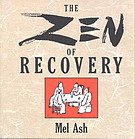The Zen of Recovery

Chapter headings:
- Thanks
- Preface
- Yet another finger pointing at the moon: An Introduction
- Foundations: The Finger
- Hi! My name is…
- What is Zen?
- What is Recovery?
- The Zen of Recovery: An Interpretation of the Twelve Steps
- The Zen of Recovery Heart Sutra
- Reflections: The Pointing
- You are enlightened already
- You are dead already
- This world is dream enough
- The emptiness of love
- The fullness of love
- Love the one you’re with
- Your defects are defective
- Moment to moment, a day at a time
- You have nothing to fear
- Alone together
- Inner child + inner monster = original face
- The further you go, the closer you get
- Directions: The Moon
- Hanging from a cliff: How to Let Go
- Killing the Buddha instead of ourselves: An Approach to Teachers and Sponsors
- A day without work is a day without eating: Personal and Global Recovery
- Sitting around, doing nothing, looking at the floor: The Spiritual Mechanics of Meditation
- The bones of others
- Yet more fingers pointing at the moon: Readings and Bibliography
Selected excerpts:
“It is my personal belief that Bill W., the author of the Twelve Steps, was an American Buddha, that he attained enlightenment as a result of his tremendous suffering and then passed on his profoundly simple teaching to us. He has saved millions from death and never, during his lifetime, asked for anything in return, not even fame, using only his last initial in lieu of his name until his death. Truly the mark of a great bodhisattva or saint. When the history of the twentieth century is written, I am certain that Bill’s introduction of the Twelve Steps will be viewed as one of the greatest spiritual, if not religious, movements of the time.” (p. 6)
“Buddha taught that our original nature, the eternal, unchanging self that has always existed, is within the reach of everyone. Everybody, claims Zen, is already complete and as one with their true selves. Only our dualistic thinking hides this shining truth. Just as the addict must fully and unconditionally accept his or her disease to attain respite, so all beings have to come to terms with the source of their suffering before they can become what both Taoists and Native Americans call “real human beings.” (p. 58)
© 1993 Mel Ash
Order this book online at Amazon
Reviews posted:
Paul –
The Zen of Recovery is a courageous, pioneering effort to introduce Buddhism to the recovery literature. Written in 1993, it is to my knowledge the first published attempt at drawing comparisons between AA and Buddhism and what an extraordinary attempt it is. The writing style is an intense outpouring from someone deeply immersed in both worlds. At times, amidst a dense torrent of words and ideas, I felt myself thinking ‘Isn’t the Zen aesthetic one of economy of expression!?’, but the sheer virtuosity and the depth of insight he has into each tradition make this well worth reading. After some introductory chapters he provides a short analysis of the Twelve Steps in the context of Buddhism, and then expands on this through a number of reflections. The guiding vision here is that we have an original state of inner stillness, inner perfection that has been clouded over. Through insight we can reach our ‘Buddha nature’ which is already complete. Once we have discovered this we no longer need to crave. Our ‘original mind’ is deeper and more profound than our conscious intellect, which is fragmented, and spews forth discursive thoughts in an impulsive way. Thus Ash uses the word ‘recovery’ with an additional Buddhist meaning: that of recovering our essential nature. A professional graphic artist and student of Beat literature as well as Buddhism, the book’s artwork reveals him to be a very capable illustrator and calligrapher. For as long as lists are compiled on Buddhism and Recovery, this work should be included.
Michael –
The Zen of Recovery is the first book that I ever read that drew parallels between Buddhism and recovery. It examines his own journey from abused child to alcoholic and Zen teacher, provides an introduction to Zen and recovery, looks briefly at each of the Twelve Steps, and finishes with a number of personal reflections. Grounded strongly in its emphasis on meditation, Zen provides powerful lessons for those in recovery and I very much enjoyed his later chapter on the mechanics of meditation. While very Zen in approach and language, the author still maintains a sense of simplicity and insight that is immediately accessible to everyone. There is a famous Zen story told at the beginning of this book where the students ask a Zen master ‘what is the moon?’. Without answering he points to the moon, and the students wrongly assume the finger itself is the answer. What we think is secret and profound is actually in plain view for all to see and grasp. So too this author’s answer to Zen and recovery, the book simply being a finger that points the way.
